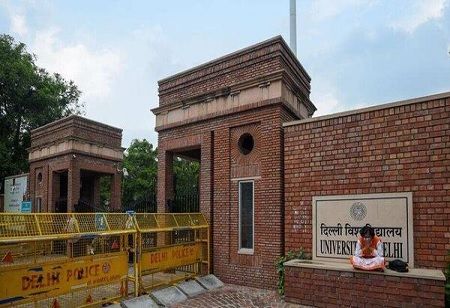- A DU panel has proposed removing or revamping MA Political Science courses on Islam, Pakistan, and China, sparking sharp debate.
- Academics allege political bias and erosion of academic freedom, warning it threatens critical inquiry and DU's academic integrity.
- Similar content revisions were suggested in Geography, Sociology, and Disaster Management, raising concerns over ideological interference in higher education.
A proposal by a Delhi University (DU) academic panel to remove several postgraduate Political Science electives focused on topics such as Islam, Pakistan, and China has triggered widespread controversy and reignited the debate on academic freedom and institutional autonomy in higher education.
The Standing Committee on Academic Matters convened on Tuesday to evaluate and revise syllabi across departments. As per committee member and Academic Council representative Dr. Monami Sinha, the MA Political Science curriculum underwent 'significant scrutiny'. Courses reportedly under review for removal or modification include: ‘Pakistan and the World’, ‘China’s Role in the Contemporary World’, ‘Islam and International Relations’, ‘Pakistan: State and Society’, and ‘Religious Nationalism and Political Violence’. These may either be scrapped or substantially restructured. The revised syllabus will be prepared by the department’s course committee before being sent through DU’s formal approval channels.
The university administration has not yet issued an official statement, but Vice Chancellor Yogesh Singh had earlier urged departments to review and eliminate content he claimed involved the “unnecessary glorification of Pakistan”. His remarks followed the April 22 terror attack in Jammu and Kashmir’s Pahalgam, adding a layer of political context to the curriculum review.
The proposal has sharply divided faculty members. Some argue the changes align with India’s strategic interests and aim to prevent ideologically skewed narratives. Others, however, see it as an infringement on academic freedom and a politically driven attempt to sanitize the curriculum.
Dr. Sinha defended the need to retain the contentious courses, stating: “It is imperative to study Pakistan and China given their central roles in India's foreign policy. Erasing these perspectives undermines critical thinking and academic integrity”.
The impact of the committee’s review extends beyond Political Science. In MA Geography, Unit 3 of Semester 1 which discusses internal conflict and religious violence, including scholarly work by Paul Brass was reportedly proposed for removal. In the Social Geography course, references to caste-based population distribution were also objected to, with suggestions to tone down caste emphasis.
The Sociology department faced criticism as well. The introductory theory course, which primarily features Western thinkers such as Marx, Weber, and Durkheim, was flagged for its lack of Indian scholars. Committee members recommended adding Indian theorists and content on traditional family structures. A reading by Kath Weston on same-sex families was also challenged on the grounds that same-sex marriage is not legally recognised in India. A course on vulnerability and disaster management was reportedly dropped altogether.
Faculty unions and academic leaders have expressed strong dissent. Abha Dev, Secretary of the Democratic Teachers’ Front (DTF), condemned the changes, saying, “The dumbing down of courses based on belief systems rather than pedagogical merit is deeply worrying. DU’s academic credibility is at stake”.
Mithuraaj Dhusiya, an elected member of the Academic Council, questioned the standing committee’s authority. “It can recommend, not enforce changes. Universities must foster critical debate, not suppress complex or uncomfortable subjects”, he stated.
As tensions mount, the incident has sparked a broader conversation on whether academic institutions can retain their autonomy amid rising ideological pressures

